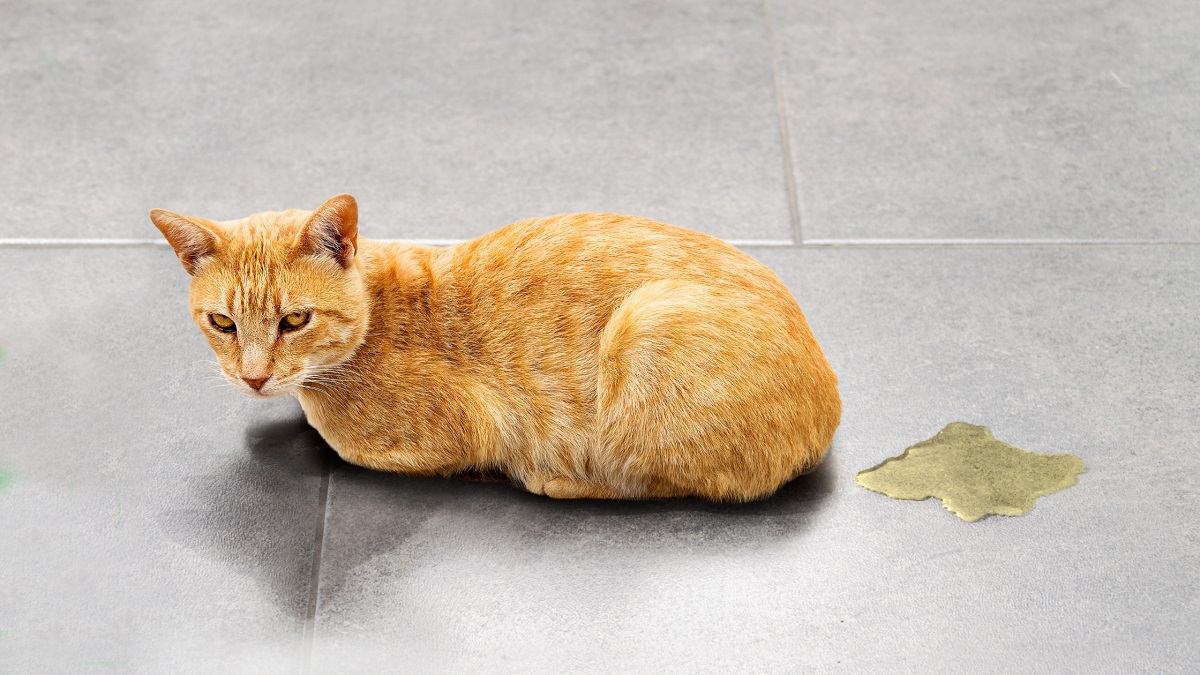The sight of a cat peeing outside the litter box can be a distressing experience for any pet owner. It often signals more than just a naughty act; it can be a sign of underlying medical issues or behavioral problems. We’ve all been there, the moment of discovery, the scent that assaults the senses, the frantic search for a cleaning solution. But before reaching for the bleach, it’s essential to understand the reasons behind this behavior. This article will delve into the world of feline urination, exploring common causes, preventive measures, and ways to deal with this unwelcome situation.

Image: diyseattle.com
My own experience with a mischievous cat named Mittens, who seemed to have a penchant for marking the back of the couch, sparked my interest in feline urination habits. It was more than just a messy prank; it was a plea for help, an attempt to communicate a need. After much research and consultation with a veterinarian, I realized that understanding cat behavior is paramount in resolving these issues. It’s not just about cleaning up the mess; it’s about recognizing why your cat is behaving in this way.
Understanding the Reasons Behind Feline Urination Problems
Cats are fastidious creatures known for their meticulous grooming habits. The idea of them urinating outside the litter box seems counterintuitive, making it all the more perplexing to cat owners. This behavior can stem from a multitude of factors, ranging from medical conditions to stress and environmental changes. The first step to addressing the issue is pinpointing the root cause.
There’s a crucial distinction between a cat “marking” and a cat “urinating inappropriately.” Marking involves spraying a small amount of urine on vertical surfaces, often to communicate territorial dominance. Inappropriate urination, however, signifies a problem, often linked to medical issues or behavioral adjustments. Understanding this difference is crucial because it allows you to tailor your response accordingly.
Medical Causes of Inappropriate Urination in Cats
One of the most common reasons for a cat to pee outside the box is a medical condition. Urinary tract infections (UTIs), bladder stones, and inflammatory bowel disease can all manifest as inappropriate urination. These conditions cause discomfort and pain, leading the cat to seek relief outside their designated area.
Other medical causes include kidney disease, diabetes, and even stress. Diabetes, for instance, can lead to increased thirst and urination, potentially overwhelming the cat’s capacity to reach the litter box regularly. Furthermore, stress-induced medical issues, such as cystitis (inflammation of the bladder), can also lead to urinary problems.
Behavioral Causes of Inappropriate Urination in Cats
Beyond medical issues, behavioral factors can also contribute to cats urinating outside the litter box. These include:
<ol>
<li><strong>Stress</strong>: Cats are sensitive creatures and can react strongly to changes in their environment. Moving to a new home, introducing a new pet, or even a change in routine can trigger stress-induced urination.</li>
<li><strong>Litter Box Aversion</strong>: Cats are finicky about their litter boxes. If the box is dirty, the litter is the wrong type, or the box is inaccessible, cats might seek an alternative.</li>
<li><strong>Territorial Issues</strong>: Cats can be territorial. If they feel threatened or insecure, they may spray urine on vertical surfaces to mark their territory, especially if there are multiple cats in the house.</li>
<li><strong>Age-Related Changes</strong>: Older cats might have difficulty reaching their litter box due to arthritis or mobility issues. This can lead to them urinating in closer proximity.</li>
</ol>

Image: storables.com
Identifying the Cause of Inappropriate Urination
The first step in resolving a cat urination problem is to identify the cause. Take your cat to the veterinarian for a checkup, especially if you suspect a medical condition. Rule out any underlying medical concerns before addressing behavioral issues.
Preventing Inappropriate Urination in Cats
Once the underlying cause, if any, is addressed, consider implementing a few preventative measures to deter future episodes:
- Maintain a Clean Litter Box: Cats are cleanliness enthusiasts. Scoop the litter box at least once a day, and change the litter entirely every week. If you have multiple cats, provide multiple litter boxes in different locations.
- Choose the Right Litter: Cats have different preferences when it comes to litter. Experiment with different types until you find one that your cat enjoys. Consider low-dust litters, as they are less irritating to sensitive noses.
- Provide Accessible Litter Boxes: Ensure the litter box is in a quiet, private location, away from noisy appliances, traffic, and other distractions. Place the box in a low-traffic area and make sure it’s easy for your cat to access.
- Reduce Stress: Create a calming and predictable environment for your cat. Provide hiding places, scratching posts, and interactive toys. If other pets live in the household, make sure they have their own space and resources available.
- Consult a Veterinarian: If the problem persists, seek advice from your veterinarian or a certified feline behaviorist. These professionals can provide personalized recommendations.
Tips and Expert Advice for Dealing with Feline Urination Problems
Here are some additional tips that can help:
<ol>
<li><strong>Clean Thoroughly:</strong> After cleaning up the mess, it's crucial to use an enzymatic cleaner to remove any lingering odor. Cats can detect residual scents, which could lead them to urinate in the same spot again.</li>
<li><strong>Positive Reinforcement:</strong> Reward your cat for using the litter box with treats or praise. This can help create a positive association with the litter box.</li>
<li><strong>Feliway Diffuser:</strong> This diffuser releases pheromones that can help cats feel more relaxed and secure in their environment.</li>
<li><strong>Avoid Punishment:</strong> Never punish your cat for urinating outside the litter box. This will only increase their stress and anxiety, possibly worsening the problem.</li>
</ol>Be patient and consistent with your efforts. It may take time to resolve the issue, but with persistence, you can help your cat regain control of their bladder.
Frequently Asked Questions
Q: What if my cat urinates on my bed?
A: The best solution is to make the bed less inviting by covering it with a waterproof and washable cover or using a pet bed instead. You may also want to consider using a repellent spray specifically designed for cats to discourage them from returning to the bed.
Q: How do I prevent my cat from spraying?
A: Cats spray to mark territory. To reduce the behavior, try to provide multiple scratch posts and designate specific areas for them to “scratch”. AFeliway diffuser that releases calming pheromones can also be helpful in reducing anxiety and territorial behaviors.
<p><strong>Q: Is there a way to clean the smell completely?</strong>
<br>
<strong>A:</strong> Use an enzymatic cleaner designed for pet stains and odors. These cleaners break down the proteins in urine, eliminating the smell that would encourage your cat to re-mark.</p> Q: What are the signs of urinary tract infections in cats?
A: Symptoms can include straining to urinate, frequent urination, blood in the urine, and licking of the urinary area. Seek veterinary attention immediately if you notice these signs.
Why Would A Cat Pee On The Floor
Conclusion
It’s important to remember that urinating outside the litter box is a communication, not an act of defiance. By understanding the potential causes, taking preventative measures, and providing appropriate care, you can help your cat overcome this problem. Remember, that your cat’s well-being is paramount. If you suspect an underlying medical issue, consult a veterinarian. If you believe stress or environmental changes are contributing to the behavior, create a calm and comfortable environment for your cat. The road to a clean home and a happy, healthy cat is a collaborative one.
Are you dealing with a cat who pees outside the litterbox? Share your experiences and ask questions in the comments below. We’d love to hear from you!






